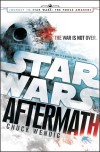The Man in the High Castle
 I first read this book twenty years ago, when I first discovered the author. I don't remember thinking much of it at the time, but that was also the time when I had been reading horror almost exclusively, and I'm not sure I was in the right place to appreciate a book like this at that time. I went on to read more of his stuff, but this novel was where I started. The show's upcoming release on Amazon prompted me to revisit the novel, since I figured I would be better able to appreciate the story now.
I first read this book twenty years ago, when I first discovered the author. I don't remember thinking much of it at the time, but that was also the time when I had been reading horror almost exclusively, and I'm not sure I was in the right place to appreciate a book like this at that time. I went on to read more of his stuff, but this novel was where I started. The show's upcoming release on Amazon prompted me to revisit the novel, since I figured I would be better able to appreciate the story now.What I remember most about reading Dick's work is how he played around with the idea of reality and how we define it. The Man in the High Castle is an ambitious look at the same theme, though it's not obvious at the start. The story begins by telling us that the United States lost WWII, and that the country is now jointly occupied by the German and Japanese governments, on the eastern and westerns halves respectively, with a neutral, ungoverned zone between the two. Given the other well-known works by Dick (Total Recall, Blade Runner, and The Minority Report were all based on his work), it would be sensible to assume that this story would involve questionable reality, or possibly even time travel, but no, the story is a quiet look at two disparate governments at work in one country, and what that would mean for the residents of that country.
The Japanese rule their part of the country as fairly as possible, allowing the culture of their occupied territory to continue, despite the fact that they still must govern under German law. The Japanese rule affects the culture in turn, creating an odd hybrid of both cultures existing together. To show this, Dick adopts an odd narrative style when it is in the PSA (the region occupied by the Japanese). The sentence structure is clipped, making it reminiscent of how the Japanese tend to speak English as a second language. It's not just in the dialogue of the Japanese characters; the narrative itself when the story is set in the western region follows that style, even when the point-of-view is not a Japanese character.
About half of the story is about an antiques dealer in the PSA, and how he deals with this new society. He attempts to be a part of it, assuming the new social graces and statuses, and he's very focused on how he is supposed to present himself to others based on their station. A simple trip to a businessman to deliver a piece intended as a gift takes on several levels of importance, not just for himself, but for the people he encounters on the way. The scene is lengthy, and illustrates the new rule better than if Dick had taken a few pages to summarize it all.
The meaning of the book seems pretty clear -- humanity will persevere, even through the darkest moments of its history -- but I struggle to understand the point of it all. The plot and characters are very thin, reducing the story to being about a book that gives an alternate history within this alternate history, where the US wins the war. The book is forbidden in the German-occupied region of the country, but allowed in the PSA and the neutral zone, and gives a different perspective on what happens at the end of the war. To further obscure the meaning of it all, the alternate history within this book is different from the reality of our own history. And one of the main characters is obsessed with understanding why and how the book was written.
As for what the book has in common with the television show, I think the answer is "Not much." The premise has been borrowed, but much of what happens in the first two episodes of the show don't even exist in the book. The book that drives the story is a movie in the show, which is understandable, but the rest of it has been changed significantly. At first I thought that the show was backing up and showing details that took place before the events in the book, but that proved not to be true. I don't see how reading the book will spoil anything regarding the show, though.
My rating of this book won't change with this re-read, but I can take more from it this time around. It's just not the sort of book I usually read, and it's not the sort of book I would expect from Dick. This book seems to stand alone from the rest of his body of work.






